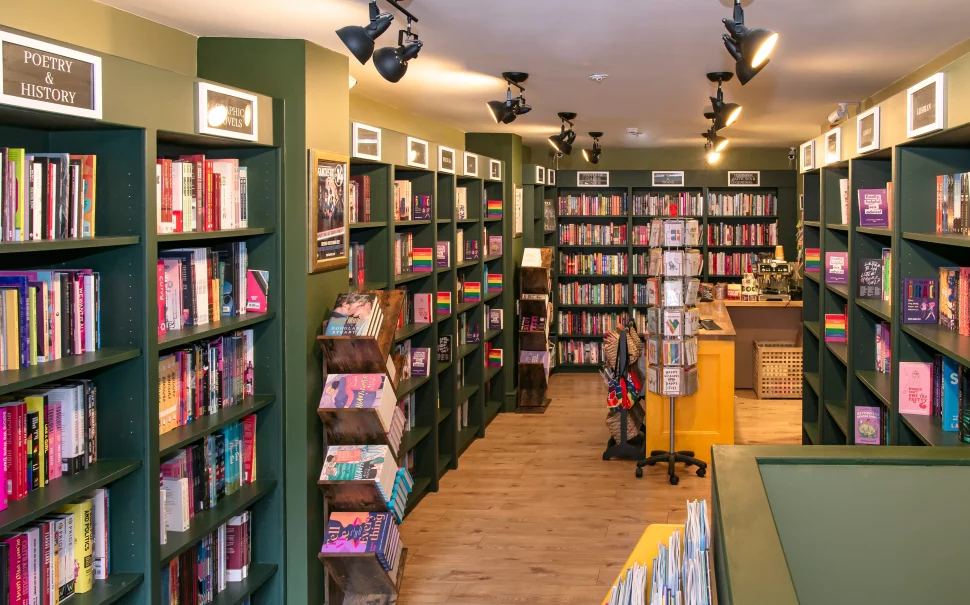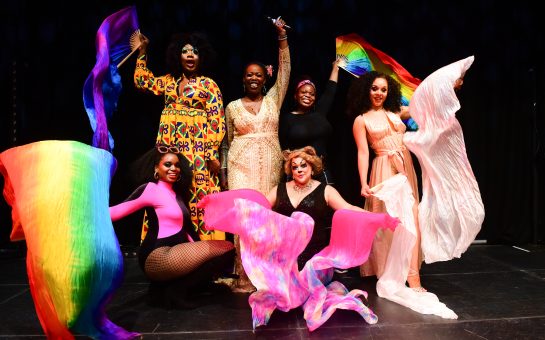Matthew Cornford, owner of Northern Quarter bookshop Queer Lit UK, spoke to MM about the success of his store, the importance of queer literature – and which books he keeps hidden under the counter.
Queer Lit UK opened online during the pandemic, selling books from founder and owner Matthew Cornford’s bedroom, but it’s now on Tib Street – with plans to move to a new building four times their current size.
The shop holds over 3100 LGBTQ+ titles.
But what is queer literature and what differentiates the service here from other bookshops?
“It gives LGBTQ+ people an opportunity to see themselves”
Cornford says: “Queer literature gives LGBTQ+ people an opportunity to see themselves within everyday literature.
“That might be where the storyline isn’t inherently queer – it might be fantasy or crime – but it just happens to be that instead of the detective going home to his wife and children at the end of the day, he goes home to his husband.
“There’s also queer literature more specifically designed to support LGBTQ+ people – things like how to understand your gender, how to understand your sexuality or how to understand transitioning as a trans person.”
”We’ve done that research for you”
Cornford decided Manchester was crying out for a queer bookshop when, on the hunt for less heteronormative crime fiction, he went to Waterstones Deansgate, the biggest bookshop in the north of England, and discovered there was no specific LGBTQ+ section.
That’s how the idea for his shop was born, he says: “You can come into our shop and say ‘I want a crime novel that’s lesbian-driven’ – and we’ve done that research for you.
“There’s shed-loads of great queer literature out there, it’s just for a normal high street bookshop it’s too specific for them to be able to get into some of those niche things that some of our community specifically come in and look for.”
Comparatively tiny, Queer Lit is able to form more of a relationship, and therefore more trust, with its customers, for example by responding to the current growth in interest in topics like asexuality and polyamory.
Inclusive children’s books are another area of interest, Cornford says: “We get loads of parents that come in looking for kids’ books – we’ve got a huge selection of toddlers’ books that are all about inclusivity, teaching kids that not everybody at pre-school’s going to have the same colour skin as you, not everybody’s going to have mummy and daddy dropping them off.
“We have parents who come in and say: ‘my kid’s just come out as trans, my kid’s just come out as non-binary – I need to understand this better, how do I discover how to support my child?’”
“The TERFy book will be hidden under the counter, where most shops would put their smut.”
As a shop that’s able to meet these more specific demands, they are able to advise when it comes to the mainstream, too, ensuring parents get age-appropriate books for children and teens.
“If you go into another bookshop and say, ‘my kid’s obsessed with Heartstopper but she’s read it all – what else is there?’ they’ll probably be able to point out four or five other queer graphic novels – we’ve got nearly 200. Some of them are absolutely Heartstopper-appropriate – some are adult erotica. We’ll be able to have a really constructive conversation.
“DeadEndia on Netflix – wonderful series, great for kids – the book drops the C-word more times than you can count. So whilst elsewhere a parent will walk in and just buy the book, here we might have that friendly conversation.
“In a small store you’re aware of your content.”
Cornfield curates the titles that make it onto the shelves carefully – although the shop orders in less welcome titles if customers want them for research and would rather pay a queer bookstore.
This happens particularly often with books by writers considered TERFs: trans-exclusionary radical feminists.
“We’ve got sexy books, risqué books, sexual imagery… but the TERFy book will be hidden away from sight, where most shops would put their smut. Our smut is the TERF stuff that I have to order in for you and hide under the counter.
“While we want to be as inclusive as possible and listen to as many views as possible, I won’t include things where the author is TERFy or racist.”
“I wanted to get books into people’s hands and get them to engage with us.”
Queer Lit actively campaigns, too. In 2021, with debate swirling around the Gender Recognition Act, it sent out hundreds of copies of Trans Britain by Christine Burns MBE to MPs across the country, “to give them comprehensive knowledge of the history of the trans community before framing laws that affect them.
“Did I expect sales to go up because of it? Absolutely not. Did I expect it to be costly? Absolutely. But we get to say ‘we sent you something you should have read before making decisions’.”
The shop launched Feel Good Book Club for similar reasons – it’s free to attend the meetings, and the books discussed are sold at cost price. The authors often attend.
Cornford explains: “I didn’t want it to be for-profit, I wanted to get books into people’s hands and get them to engage.
“We’re reading the latest stuff: the book for January is the Booker Prize winner, the biggest title out there, but normally it would be £17.00 – here it’s less than £10.00. It’s been a great success.”
It’s clear that Queer Lit is doing all it can to push the boundaries of what an independent bookshop can achieve. This is a success story of a Manchester company not accepting the bare minimum, and wanting to be there for a community it knows will support it in return.
It can only be positive that a recent study by the Booksellers Association found the number of independent bookshops in the UK is at a ten-year high, and that since the pandemic book sales have gone up 30% and held.
“Fingers crossed,” says Cornford, “the gays still read.”
Photo: Queer Lit UK




